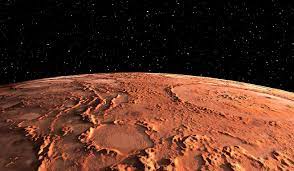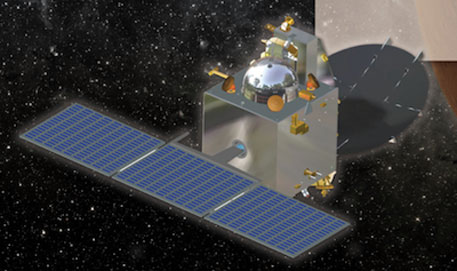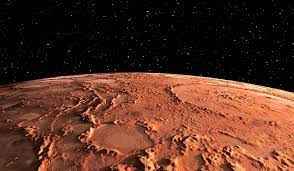The Mars Orbiter Mission (MOM) is India’s first interplanetary mission.
The Indian Space Research Organisation (ISRO) lost contact with its Mars Orbiter Mission (MOM) spacecraft on September 27, 2019, after it ran out of fuel, ending an epic journey of over eight years. The spacecraft was launched in 2013 but had been continuously traveling through space for the past five years. The spacecraft had been orbiting Mars since March 2018 and was supposed to transmit data back to Earth until the end of its life.
The spacecraft was launched on November 5,
A spacecraft lost contact with the Indian Space Research Organisation (ISRO) ‘s Mars Orbiter Mission (MOM) on November 5,
The spacecraft was launched on November 5, 2014, and was supposed to reach Mars by September 30, 2015, but it failed to do so. It has been orbiting Mars since January 20, 2015, and was initially scheduled to end its mission in September.
The mission is expected to last for around two years.
The Indian Space Research Organisation (ISRO) lost contact with the Mars Orbiter Mission (MOM) on September 28, 2018. The mission was expected to last for around two years, but the spacecraft ran out of fuel after just over six months. The space agency has not yet revealed any details about the failure, but it is believed that a leak in the spacecraft’s fuel system may have caused the loss of communication.
The spacecraft is designed to study the surface and atmosphere of Mars.
A Mars Orbiter Mission (MOM) spacecraft is lost after a technical glitch causes it to run out of fuel. The Indian Space Research Organisation (ISRO) has launched the $141 million mission in a bid to understand the Red Planet’s surface. The MOM spacecraft was launched from the Satish Dhawan Space Centre in Sriharikota on September 24,
It is scheduled to arrive at Mars on September 24. The mission is expected to last for at least one Martian year, or 687 days. The spacecraft has been named Mangalyaan, which means “Mars craft” in Sanskrit.
MOM carries seven scientific instruments.
The Mars Orbiter Mission (MOM) has been orbiting the red planet for nearly a year now. But the mission is about to come to an end, as NASA’s Mars Reconnaissance Orbiter has lost contact with the craft. The craft has been running out of fuel since March 1, and now it’s time for the probe to head back home.
The spacecraft is powered by fuel and solar energy.

A few months ago, the Indian Space Research Organisation (ISRO) lost contact with its Mars Orbiter Mission (MOM). The spacecraft was in the final stage of its journey to the red planet. It was successfully launched in November 2014. The mission was to collect data about Mars and its atmosphere, and it had spent the last two years traveling through space. However, the spacecraft ran out of fuel, and its mission was over.
The spacecraft can travel at a speed of about 20,000 km/h
ISRO’s Mars Orbiter Mission (MOM), an ambitious project to study the Red Planet, has lost contact with the spacecraft, according to a report in The Times of India. The spacecraft was launched from Sriharikota in Andhra Pradesh on November 5, 2013, and its mission is to study the Martian atmosphere. The spacecraft is now moving away from the planet at a speed of about 20,000 kilometers per hour.
The mission is being managed by the Indian Space Research Organization (ISRO).
After a decade of research and development, the Indian Space Research Organization (ISRO) successfully launched the Mangalyaan probe into space on November 5, 2013. The mission is to send a satellite to orbit around Mars and study its atmosphere.
The spacecraft will be placed in an orbit around Mars.
The Indian Space Research Organisation (ISRO) lost contact with its Mars Orbiter Mission (MOM) spacecraft on September 28, 2018, after the spacecraft ran out of fuel and was unable to communicate with Earth. MOM was launched on November 5, 2013, and is scheduled to reach the Red Planet on September 24, 2019. The spacecraft was initially slated to arrive at Mars on September 24, 2016, but was delayed due to a technical problem.
The spacecraft will then perform scientific experiments.
An uncrewed spacecraft that was launched on a Mars mission has lost contact with Earth as it runs out of fuel. The Indian Space Research Organisation (ISRO) lost touch with the Orbiter at 10:27 GMT on Sunday (8:27 am IST) after its solar panels stopped working. The Mars Orbiter Mission (MOM), which was launched in November 2013, was supposed to be used to study the Martian atmosphere and surface. It was also going to be the first Indian spacecraft to reach Mars. It is the first time that an Indian spacecraft will be orbiting another planet.

The spacecraft will then return data to Earth.
The Mars Orbiter Mission (MOM) was launched on November 5, 2013, and is currently in its second orbit around the red planet. It is the first mission of the Indian Space Research Organisation (ISRO). The spacecraft was designed, built, and operated by a consortium of Indian institutions led by the Indian Space Research Organisation. The MOM will orbit Mars for a minimum of 15 months. The spacecraft will be the first to enter Martian orbit, and it will transmit data back to Earth for a period of one year. The spacecraft will be the first to map the surface of Mars in the southern hemisphere and will also study the atmosphere and surface features of the planet. The spacecraft is named after the first woman to reach space, the first Indian in space, and the first Indian to travel to the moon, Kalpana Chawla.
MOM was initially scheduled to land on Mars on September 24,
A team of scientists led by the Indian Space Research Organisation (ISRO) lost contact with Mars Orbiter Mission (MOM) spacecraft after it ran out of fuel. The Indian space agency has been unable to get a signal from the spacecraft since December 18, 2018. The ISRO said that the satellite was expected to enter the Mars atmosphere in about three days.
However, on September 22, 2014, ISRO announced that MOM had lost contact with Earth.
A few weeks ago, the Indian Space Research Organization (ISRO) lost contact with its Mars Orbiter Mission (MOM). The mission was launched in 2013 to study the Martian atmosphere and surface. It was designed to last a year and a half. It has been lost since September 22, 2014. It is believed that the spacecraft has crashed into the planet.
The spacecraft has been orbiting Mars since November 5,
India’s Mars Orbiter Mission (MOM) has been orbiting Mars since November 5, 2013. But the mission is over. The Indian Space Research Organisation (ISRO) has lost contact with the spacecraft. The MOM is now on its way back to Earth. The mission has been a success so far. It has sent back valuable information about the surface of Mars. It has also provided us with a wealth of information about the planet’s weather, atmosphere, and magnetic field.
On November 23, 2014, ISRO announced that the spacecraft was still alive and would continue to orbit Mars.
The Indian Space Research Organisation (ISRO) lost contact with its Mars Orbiter Mission (MOM) spacecraft on November 23, 2014, after it ran out of fuel and entered the Mars atmosphere. The spacecraft has been orbiting Mars since September 24, 2014.
The mission cost is about US$74 million (approx. Rs. 478)
A significant setback in the Indian Space Research Organisation’s (ISRO) Mars Orbiter Mission (MOM) project has been reported. The $74 million mission has lost contact with Mars, and it is feared that the spacecraft will crash into the planet. The news of the loss of communication with the Orbiter was first revealed by the ISRO in a press conference held on Thursday.



Thanks for sharing your info. I really appreciate your efforts and I will be waiting for your next
post thanks once again.
Excellent beat ! I would like to apprentice even as you amend your web site, how could i subscribe
for a blog website? The account helped me a applicable deal.
I had been tiny bit familiar of this your broadcast provided vibrant transparent concept